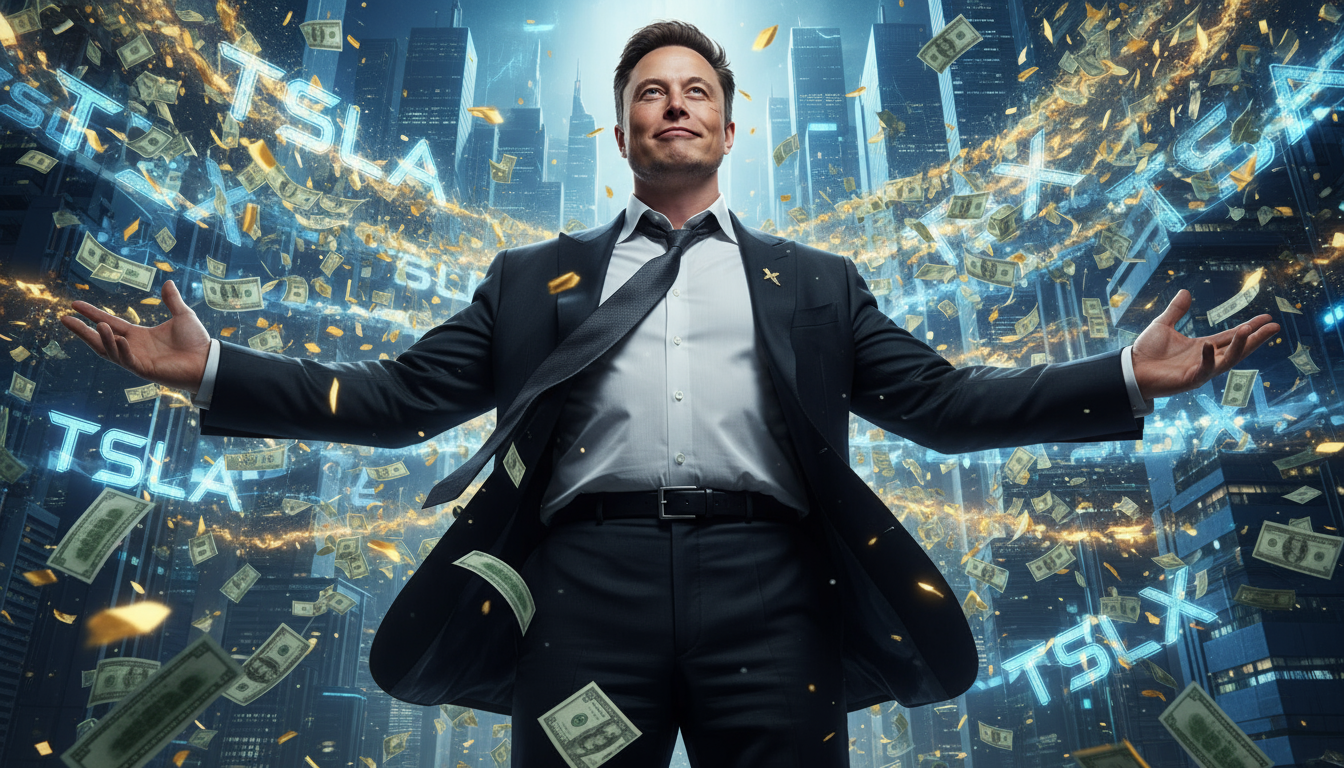October 29, 2025 – Austin, Texas
In the high-stakes theater of corporate America, where fortunes are forged in boardrooms and shattered on ballots, Tesla Inc. stands at a precipice. On November 6, shareholders will cast their votes on what could become the most audacious compensation package in history: a potential $1 trillion equity windfall for CEO Elon Musk. Tied to audacious milestones that could catapult Tesla into a sci-fi future of robotaxis and humanoid bots, the deal has ignited a firestorm of opposition from labor unions, Democratic lawmakers, and even top proxy advisors. Yet, as Tesla's electric empire hums with fresh software updates and Bitcoin hoards, the vote isn't just about pay—it's a referendum on Musk's iron grip, his divided attentions, and the soul of a company that redefined mobility.
The $1 Trillion Proposal
The package, unveiled earlier this year amid Tesla's rollercoaster ride through regulatory scrutiny and market volatility, rewards Musk with stock options vesting only upon hitting a constellation of performance targets. These include ballooning Tesla's market capitalization by a staggering $7.5 trillion—nearly quadrupling its current $800 billion valuation—and operational feats like deploying a fleet of fully autonomous robotaxis and scaling production of Optimus AI robots to millions of units annually. Proponents, including Tesla's board chaired by Robyn Denholm, frame it as a masterstroke of alignment: Musk's skin in the game ensures laser-focused execution on Tesla's moonshot ambitions.
"This isn't just compensation; it's a covenant for transformation," Denholm argued in a recent proxy statement, warning that rejection could prompt Musk to "pursue opportunities elsewhere."
A Firestorm of Opposition
But the backlash is visceral and multifaceted, painting the deal as less a meritocracy than a coronation of unchecked power. Labor unions, long at odds with Tesla's non-union factories, have mobilized fiercely. Tejal Patel, executive director of the union-backed SOC Investment Group, decried the proposal as a
accusing the board of rubber-stamping Musk's whims at the expense of workers' rights and equitable governance. Democratic heavyweights have piled on, with New York State Comptroller Thomas DiNapoli labeling it"relinquish[ing] of meaningful shareholder voice,"
that another mega-payout will refocus a CEO whose X (formerly Twitter) feed brims with political provocations. "This is not pay for performance. It is pay for unchecked power," echoed New York City Comptroller Brad Lander, invoking the "era of robber barons" in a pointed rebuke."illogical" and "contrary to the evidence"
Even the gatekeepers of institutional investing—proxy advisory firms Glass Lewis and Institutional Shareholder Services (ISS)—have urged a "no" vote, citing governance red flags and the deal's eye-watering scale. It's a rare consensus in a polarized landscape, underscoring how Musk's polarizing persona has seeped into the C-suite calculus. A fresh Yahoo Finance report, released just hours ago, quantifies the toll: Musk's 2025 political forays—from endorsing controversial figures to amplifying divisive narratives on X—have eroded Tesla's brand appeal among progressive consumers by up to 15%, per internal surveys, potentially shaving billions from EV sales in key blue-state markets.
The Path to Approval
Yet, for all the outrage, the math tilts toward approval. Musk controls about 13% of Tesla's shares through his own holdings and allies, and retail investors—fiercely loyal "Tesla cultists"—hold another 40%, though their historically low turnout could prove decisive. Pension funds in Republican strongholds like Texas and Florida are vocally supportive, praising the milestones as "transformative value creation." Alexandra Merz, a self-proclaimed "Fangirl of Elon" and retail advocate, captured the fervor on X:
"This challenges Elon to build an empire that reshapes humanity—robotaxis zipping through cities, Optimus bots revolutionizing labor. Say yes to the future."
Precedent, Probes, and Pivots
This isn't Musk's first rodeo with blockbuster pay. His 2018 $56 billion package, voided by a Delaware court last year on fiduciary grounds, was resuscitated by shareholders in a 2024 revote—a pyrrhic victory now tangled in appeals. The $1 trillion sequel escalates the stakes, arriving as Tesla navigates twin tempests: a U.S. NHTSA probe into Full Self-Driving (FSD) software glitches, and a strategic pivot from delayed Robotaxi unveilings to incremental FSD rollouts. Today alone, Tesla pushed wide waves of FSD v14.1.4 to North American vehicles, eliciting early praise for smoother urban navigation but fresh scrutiny over phantom braking incidents. Musk, undeterred, touted on X that Tesla's autonomy
even as Robotaxi ambitions face regulatory headwinds."might spread faster than any technology ever,"
Deeper still, the package whispers of Tesla's existential pivot. With EV demand softening amid Chinese competition and subsidy cuts, Musk's gaze has shifted to AI and autonomy as the next gold rush. Holding firm on $1.3 billion in Bitcoin—while sibling firm SpaceX liquidated $400 million in holdings—Tesla signals unyielding bets on disruptive assets. Reject the deal, and not only might Musk bolt (Bloomberg reports Tesla scouting internal CEO successors like Vaibhav Taneja or Tom Zhu), but the company's AI odyssey could falter, ceding ground to rivals like Waymo or xAI—ironically, Musk's own venture. Approve it, and Tesla entrenches a CEO whose genius is matched only by his chaos, potentially supercharging innovation but amplifying risks of regulatory reprisal and talent exodus.
A Referendum on the Future
As the November 6 deadline looms, Tesla's fate hangs on a ballot that transcends dollars: Will shareholders anoint a visionary unbound, or demand accountability from a man who dreams of Mars but dwells in the maelstrom of Earth? In Austin's gleaming Gigafactory, where Optimus prototypes shuffle toward sentience, the answer could redefine not just one company, but the velocity of human progress.

